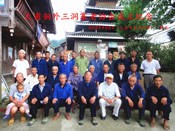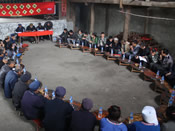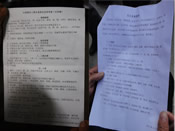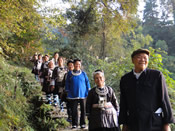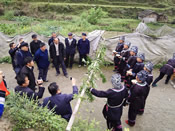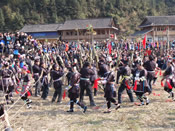
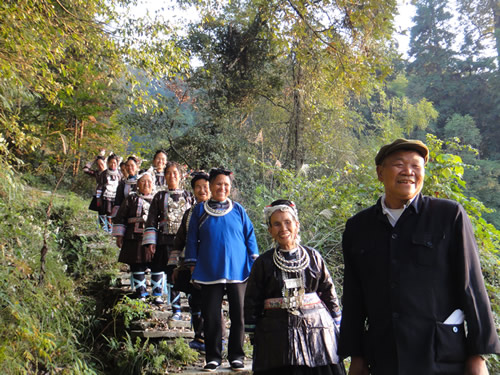 |
| The Association has been organising patrols in villages to look out for dangers, such as fire, and to identify problems of sanitation and environment, which also helps villagers become familiar with each other. (Zhan Wei) |
By Zhan Wei (Former PCD Programme Officer)
|
Editor's note: In the ecological agricultural programme in Waisandong in Liping County, Guizhou Province, a collaboration between PCD and the County Bureau of Minority Affairs, one of the goals and areas of work is to nourish local traditional organisations to preserve and pass on the traditional culture of the Dong people, the local minority ethnic group, under the leadership of local village elders. In local traditional community structure, the village elders of Waisandong play a very important role in village affairs. However, in the last few decades, their role has diminished. The ecological agricultural programme has therefore provided grant, training and exchange opportunities to the village elders and has facilitated activities such as events for playing lushen (a kind of musical instrument), singing Dong songs, and exposure trips for exchange. Consequently, the village elders recognise that they have an important role in their community and their self-confidence is revived as they gain more knowledge of Dong’s traditional culture. By restoring the role of village elders in the local community, it is anticipated that they will lead the local effort in preserving and passing on local and communal traditions. In this article, Zhan Wei depicted how the village elders initiated and won the consensus of the villagers to establish a village charter and rules to restore traditional ways of life which emphasise simplicity and frugality and to give up wasteful habits. |
On the sixth day of the Chinese New Year in 2016, the wife of Wu Yuancai, a villager of Zhainan Village, died. Since it occurred during the New Year Festival, Wu’s children wanted to have a grand funeral for their mother. Wu objected adamantly and insisted that the funeral be simple and plain. The rule must not be broken, he insisted.
What was the rule that Wu was referring to? Why did he insist on abiding by the rule?
Reflecting on the trend of extravagancy, wastefulness and envious comparison
Zainan Village is one of the villages which make up the Tianfudong Waisandong Cultural Village (the other four villages are Gaojin Village, Liufang Village, Zaimu Village and Zaitou Village). At the end of 2015, led by the village elders and facilitated by village cadres, a meeting of villagers from all five villages was held to discuss establishing a village charter and rules to regulate customs concerning weddings, funerals and gifts. Villagers agreed that the rules, as trial measures, should come into effect on the first day of the Chinese New Year. The funeral of old Mrs. Wu was the first funeral to take place after the charter and rules were implemented. Mr. Wu was an old village cadre. Whether the new charter and rules could be implemented in the long run depends on whether village cadres could take the lead. Mr. Wu therefore, out of consideration for the well-being of the village, insisted that the funeral be simple and plain, and should not be extravagant or wasteful. In this way, the Wu family set an example for all the villages.
It is part of the local tradition of the Dong people to run their villages using village charters and rules. Evidence could be found in the region of Tianfudong Waisandong. In Zaimu Village, there is a stone tablet which was over a hundred years old. On it was inscribed village rules, including those governing weddings, funerals and gifts as well as rewards and penalties. These rules were implemented under the leadership of village elders who used to play a very important role in the village affairs. That was why the drafting and implementation of village rules must be led by village elders. They were the ones who had the say in the village. There is an old saying among the Dong people: “The ancient trees guard the village and the elders run it.” In other words, village elders were leaders. If there was any villager who did not abide by the rules, village elders would speak out and the villager would not dare to challenge their authority.
Exploring the traditional culture and the role of village elders
However, over the last few decades, old village rules have lost their hold on the villagers. There are many reasons one of which is the weakened authority of the village elders. At the same time, influenced by the mainstream culture of the world outside, the younger generation of Dong people spend lavishly on both weddings and funerals to show off. Banquets have become more and more extravagant and villagers compare and compete in lavish spending. This has become not only a pressure for the hosts, but also for those who attend funerals and weddings. Wedding and funeral gifts have become a major burden for families who are not well off economically and traditional exchange activities among villages stopped thus.
In 2015, our programme in Liping helped to restore the traditional village elders’ platform of Waisandong so that elderly people of the villages could have more opportunity to meet and discuss village affairs, problems and viable solutions. Why had the programme expanded its coverage to the five villages of Waisandong? The story began with the initiative to promote organic farming in Liufang Village which had restored traditional way of farming and farming culture because of practicing organic farming. In farming cultures, neighbouring villages have very close relationship with each other. In the olden days, Liufang and four of the villages of Waisandong were all part of a xiaokuan (a region formed by a few villages in traditional Dong communities) and belonged to the same cultural circle. Liufang villagers felt that any discussion of traditional culture had to include the other four villages. At the same time, community surveys showed that village elders were very worried and upset with the problems they saw in their villages. However, none of them dared to take the lead to organise the village elders. Consequently, our programme at Liufang held a meeting for the elders of the villages and helped them to establish the Waisandong Village Elders Association. The first task of the new established organisation was to draft a new village charter and rules.
Since it was established six months ago, the village elders have met numerous times. They focused on discussing and identifying pressing problems that their villages must tackle. The conclusion was that the practice of wedding and funeral gifts must be regulated. They came up with a framework on a village charter and rules and requested village cadres to mobilise villagers to attend a general meeting. After discussion, suggestions of villagers were incorporated and the new charter was printed and distributed to all the families for discussion and amendments. Each family signed the agreement which was then again amended after further discussion. Then the final draft was approved and the date for its implementation was agreed upon. Led by the Village Elders Association, village elders of each village initiated discussion among villagers while village cadres also played a part in supporting and facilitating the work of village elders.
Reflection on wedding and funeral gifts
Wu Xianbiao, president of Waisandong Village Elders Association and a village elder of Zaitou Village played a very important role in the process. He mobilised village elders in the discussion and coordinated with the village party committees in the process. “The role of village elders has become smaller gradually in the last few decades. In our tradition, a lot of village affairs were run by village elders, but now village elders did not dare to interfere in village affairs because they were afraid that people would talk at their backs. Now the Village Elders Association does not represent only one village, but the xiaokuan of Waisandong. They are not only qualified to speak but also have the responsibility to act. It’s not just the village elders who thought that wedding and funeral gifts was a problem and that the practice must be changed, many villagers thought so too. When the village elders proposed that something must be done about this problem, most people supported us,” said Wu Xianbiao.
While the problem appeared to be something straight and simple, the village elders had to make a lot of effort to tackle it. After they came up with their proposal, they went back to their own villages to discuss with the villagers. When they met someone, who did not agree with the idea, they were joined by village cadres in explaining to the villagers the reasons and to persuade them. Some young villagers did not understand why village elders had to bring up the subject. They thought that it was natural that young people wanted to do something nice with the money they got. It was young people’s business and had nothing to do with the village elders. The village elders had to approach the parents of those who opposed the rules to convince them. In the end, over 90% of the villagers signed the new charter and agreed to abide by the new village rules. The Village Elders Association was asked to monitor the implementation of the charter.
All five members of the Village Elders Association were present at the funeral of old Wu Yuancai’s wife. Wu had invited them because he was worried that his relatives did not understand why the funeral was so simple and thought he was stingy. Because of the presence of other village elders, his relatives and friends had been successfully persuaded. In addition, the presence of the Village Elders Association in the event of the first-time implementation of the new village rules for monitoring the practices reminded other families that they must abide by the rules in the future. They are village rules that everyone must follow.
Old Mr. Wu was moved and relieved that his children understood and supported him. The fact that he was the old party secretary of his village and that he took the lead to follow the new rules and stick to them strictly, the other villagers could not complain and had to abide by the village rules.
New village rules to advocate spending less
“As the first person to implement the new rules, I felt a lot of pressure because villagers were going to talk. Fortunately, I had the support of the Village Elders Association. When we did the account after the funeral, we found that we had spent ten thousand yuan less than usual. In the past, whether it was children or adult, everyone who attended the funeral had to wear the mourning clothes. One had to spend around 3,000 yuan just to buy the cloth for making the clothes. Now only the children, grandchildren and the sons-in-law wore the mourning clothes, so much money was saved. In the past, you had to have around 16 to 18 types of food at the post-funeral reception, many of which had to be bought from restaurants. Now the rule is you only need to serve 8 to 10 types of food, most of which are to be prepared from your own crops and cattle. This is to reduce reliance on external supply. In the past, you had to give rice and meat to those who attended the funeral in return for their monetary gifts. Since people differed from how much they gave in return, people started to compare and compete with each other. Now this practice is scrapped. The burden on villagers is reduced and the common practice of comparing and competing is put on hold. Reliance on external supply is also reduced.”
“We felt the pressure because we were worried that the people did not support or understand the new measures. Unexpectedly many people stood up for it. Because of this, we gained a lot of confidence,” said President Wu of the Village Elders Association. By reforming the customs of wedding and funeral gifts, the practice of lavish spending has become less. This has won the support of many families who are not well off economically and has also stopped the habit of comparing and competing among each other in the villages. In this way, the relationship among villages have become more harmonious. Since the pressure brought by wedding and funeral gifts is reduced, exchanges and traditional activities between villages have been restored. By advocating less reliance on external supply, villagers have also started to reflect on their relationship with food and the philosophy and value of self-sufficiency.
Giving guidance to the young by inheriting the precious culture of ancestors
By rebuilding the traditional platform of village elders and by fostering exchange among villages through the platform, the role of village elders is revived. This village public platform, which had stopped functioning for over three decades, has now revived its role in running public affairs of the villages. Establishing rules to regulate wedding and funeral gifts is only the first thing that village elders have done. They hope that more villagers would join in since they are restrained in how much they could do. They can take the lead to organise but in terms of implementation, they have their constraint. For this reason, from this year onwards, under the leadership of the elders and with the help of village cadres, young people have joined in organising, by taking up concrete roles, many cultural exchange activities held among villages during traditional festivals, such as Lushen performance during the Spring Festival, Dong song singing on June Sixth, as well as in exchanges and learning visits outside of their villages.
Now more and more villagers have begun to show concern about the changes in their villages. These exchange activities have enhanced cohesion among the villagers. They have also begun to pay attention to their physical health and to the change in the environment of their villages. The Village Elders Association plans to mobilise young people to clear the garbage that have been dumped into the river and to discuss the reasons of the change of the environment around the river. Their goal is to encourage young people to reconsider ways to live in harmony with Nature.
Translator: Cheung Choi-wan
English Editor: Dominique Hua


